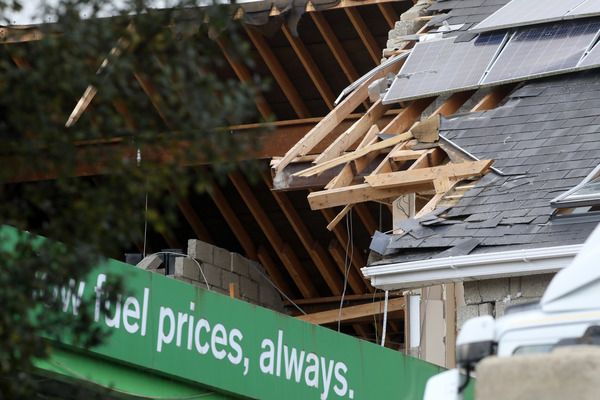THERE are some linguists who claim that, in the truly big moments of our lives, language is weak and even silent. When we’re overcome with joy or grief we cry out, not in words but in a primitive yell of happiness or pain. The happiness yells can be heard from supporters of the winning team when the full-time whistle blows. The grief-filled silence could be heard in the aftermath of the service station explosion in Creeslough last week, when ten people were killed.
Locals who were interviewed fell back on clichés – “devastated” was used by several, along with “There are no words”. That last is true – there are no words to describe or explain how ten lives were quenched in a quiet Donegal village. Death baffles us all at any time; when it happens in a quiet village and on this scale, people are shocked into silence. Why did it happen? Was it pure chance? And if so, why should pure chance choose ordinary people and children to plunge into death? The local church was full for Mass, with suffering people seeking, if not explanation, then some crumb of consolation.
If someone had deliberately targeted Creeslough, we would rightly feel appalled. Surely no-one with an ounce of humanity would inflict such suffering on innocent, decent people?
Well, as it happens, plenty of people, although not in Creeslough. As talk is made of using limited nuclear weapons in Ukraine, Vladimir Putin reminded the West that they – or more specifically the US – were the first to use nuclear weapons nearly eighty years ago. The Americans have always argued that they did what they did to save further loss of life, but how can you claim you’re saving life by expunging the lives of hundreds of thousands of innocent people?
In the past week, President Zelinskiy has declared more success by Ukrainian troops – another three villages in Ukraine’s southern Kherson region have been taken back from Russian troops. There are no exact figures as to how many lives of combatants or civilians were taken in southern Kherson, but you may be sure it exceeded the number of lives lost in Creeslough.
Do we explain lives lost in Kherson as lives lost in a noble cause? And would the families of the victims feel it was worth it, and glory in the loss of their loved ones? I doubt it. In the case of villages and towns in Kherson and throughout Ukraine, there is no mystery attached to how the deaths occurred: they died as a result of Russian or Ukrainian weapons being fired against them. And the response on all sides was one of deep grief.
The war in Ukraine is a long way from Ireland, which makes it easier for us to accept it. But for better or worse, we are complicit – as is the West in general – for the lives lost in the retaking of those villages. We hear speeches commending the warrior resistance of the Ukrainian people. The US, Europe and the south of Ireland have publicly declared they support the Ukrainian army and that they were proud to send them more weapons so that they could free other parts of their country of Russians. Or put another way: the West sent them weapons to help them kill Russian soldiers.
If the people of Creeslough are today silently suffering the pain of lost lives, so too are the loved ones of every soldier and civilian, Ukrainian or Russian, in the war there. In some ways the deaths in Creeslough were less horrific: they appear to be victims of a grim accident.
In Ukraine it’s all deliberate and man-made.








